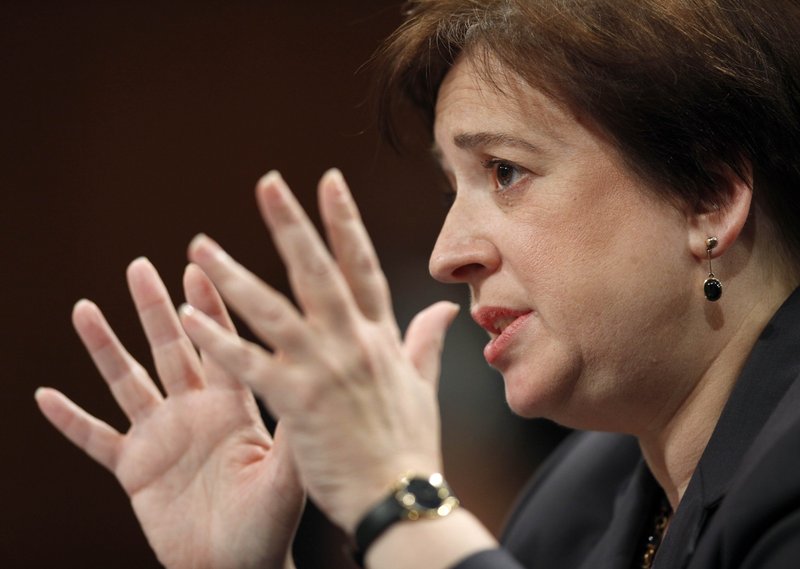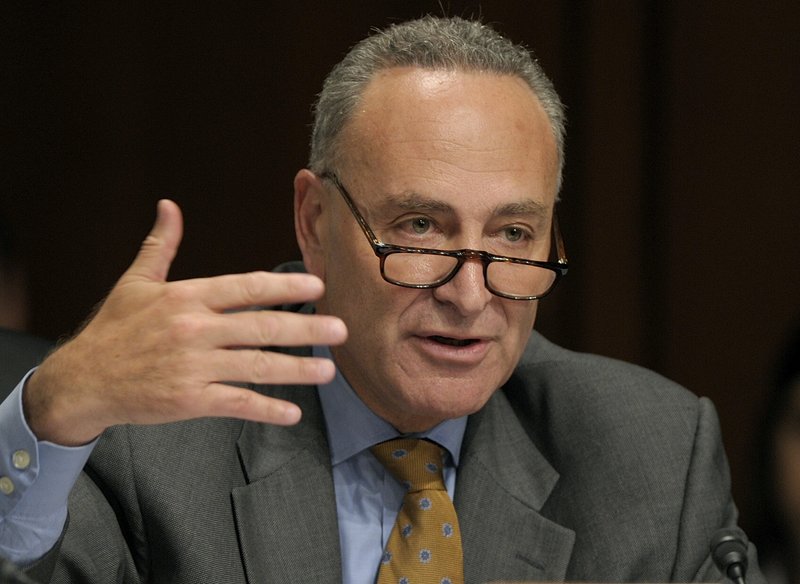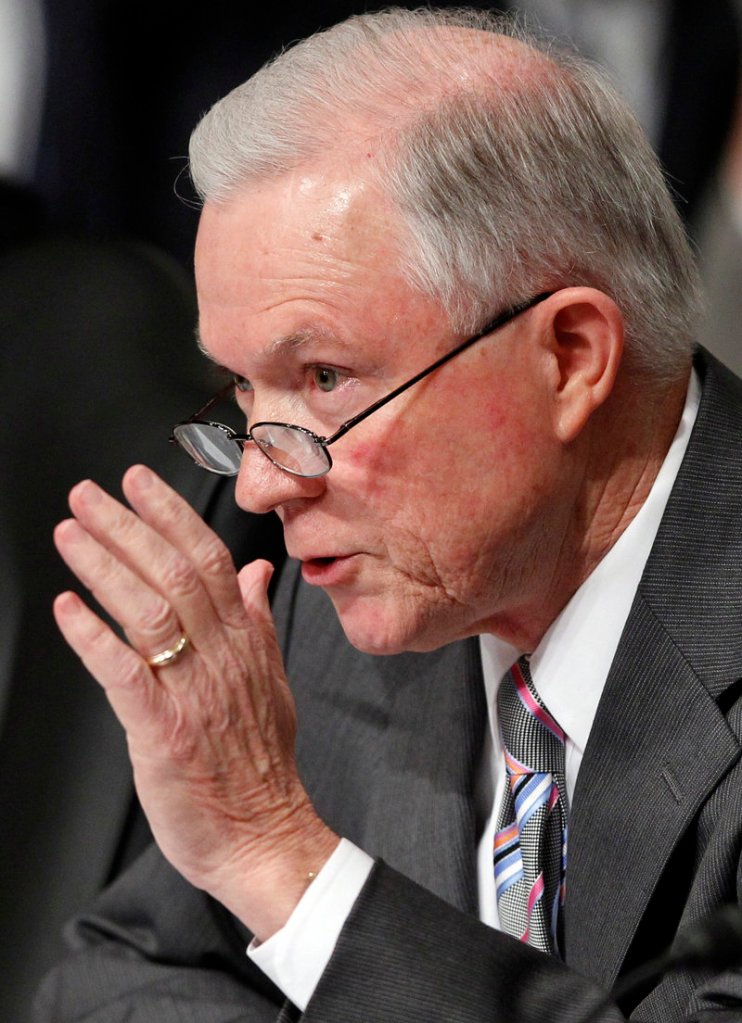WASHINGTON – Elena Kagan told the Senate Judiciary Committee on Tuesday that her political outlook is “generally progressive,” but the glimpses she offered of her legal views defied Republican efforts to pigeonhole the type of Supreme Court justice she would be.
During the first day of questioning at her confirmation hearings, Kagan said she respects legal precedent that upholds people’s right to own guns and that she supports the use of military commissions to prosecute enemy combatants – positions favored by many conservatives.
But she also suggested that a controversial requirement in the new federal health-care law – that most Americans obtain coverage – has a legal basis, a question that is likely to come before the courts. She indicated that she differed with a recent Supreme Court decision that struck down limits on corporate contributions to political campaigns. And she adamantly defended her reluctance as a Harvard Law School dean to sponsor military recruiters on campus because of the ban on openly gay men and women serving in the armed forces.
During more than eight hours of friendly questions by Democratic senators and sharper grilling by Republicans, Kagan, 50, remained somewhat guarded. At times, she retreated into broad statements about the workings of the Constitution or recited legal precedent on polarizing questions without divulging her personal views. Nevertheless, for a nominee who has spent her career in government and academia – without displaying much of an ideology – her testimony provided the strongest clues to date of her beliefs.
Kagan noted that she has worked for two Democratic presidents, including as President Obama’s solicitor general. But at several points during the hearings, she played to conservatives.
She said she has “the greatest admiration” for Justice Antonin Scalia, one of the high court’s most conservative members. And she said that military lawyers she has worked with have been “stunningly good.”
Such an explicit bipartisan appeal was a central theme of Kagan’s performance as the televised hearings provided Americans the first opportunity to hear from her since her nomination in May to become the 112th justice – and the fourth woman – to serve on the nation’s highest court.
Her demeanor contrasted markedly with that on Monday, the first day of the hearings, when she sat silently for hours, wearing a slightly uncomfortable expression, until she somberly read a prepared opening statement. On Tuesday, she loosened up. She smiled. She showed frequent flashes of wit.
At one point, Sen. Lindsey Graham, R-S.C., introduced a line of questioning about Miranda rights and military commissions by recalling the unsuccessful attempt to bomb an airplane last Christmas. He asked the nominee where she was on Christmas Day.
“You know, like all Jews, I was probably at a Chinese restaurant,” she replied, as the other senators and audience members in the hearing room burst into laughter.
During the pointed questions from several of the committee’s Republicans, Kagan did not appear stumped at any point, nor did she commit any obvious gaffes. The committee, which has a 12-7 Democratic majority, is almost certain to forward her nomination to the full Senate, which probably will schedule a final vote in late July.
the end of the afternoon, Sen. Tom Coburn, R-Okla., one of the panel’s most conservative members, told Kagan that she is smart and “tough as nails.” The hearing will resume at 9 a.m. today.
Democrats said Kagan was being candid and demonstrating why she’d be a good justice.
The hearings, said Sen. Chuck Schumer, D-N.Y., are “showing the American people that you are the kind of person many of us believe you to be – thoughtful and practical and moderate.”
Kagan rebutted Republicans’ efforts to tie her to the left. “(My) politics would be, must be, have to be completely separate from my judging,” she said.
Sen. Jon Kyl, R-Ariz., prodded her to talk about the extent to which she had absorbed the values of one of her mentors, Justice Thurgood Marshall, for whom she clerked, including his belief in the law as a tool to help “the little guy.”
Kagan sidestepped the question. “The courts are open to all people and will listen respectfully with attention to all claims,” she said. “I love Justice Marshall. He did an enormous amount for me. But if you confirm me to this position, you will get Justice Kagan. You won’t get Justice Marshall.”
Coburn asked how she would take off her “political hat” if she became a justice, referring to her time as a legal and domestic policy adviser to President Bill Clinton.
“That has not been on for many years,” Kagan shot back. “So many people have said, ‘Oh, she’s such a political person.’ I’ve had a 25-year career in the law. Four were in the Clinton White House. (This) is by no means the major part of my career.”
Kagan signaled, however, that she sided with a controversial aspect of a major domestic-policy accomplishment of the Obama administration and the Democratic-controlled Congress: enacting a health care law that for the first time will require most legal U.S. residents to obtain insurance. Some Republicans contend that such a mandate is unconstitutional, and GOP-led states are threatening to file lawsuits challenging the provision.
Kagan declined to address the requirement itself, but made clear that she supported an expansive reading of Congress’ regulatory authority. She said that part of the Constitution “grants broad deference to Congress in this area” and “assumes that Congress knows what is necessary to regulate the country’s economy.”
The most sustained and pointed questioning came on an issue that Republicans have made clear for weeks would be at the core of their criticism: Kagan’s statements and actions regarding military recruiting at Harvard Law School. Sen. Jeff Sessions of Alabama, the committee’s ranking Republican, chastised Kagan’s treatment of the military, saying, “You were taking steps to treat them in a second-class way and not give them the same equal access because you deeply opposed their policy” on gays.
Kagan stood by her opposition to the “don’t ask, don’t tell” policy, calling it “unwise and unjust.” But she said she “respects and reveres” the military, and she contended that “military recruiters had access to Harvard students every day I was dean.” She did not mention that, during the spring of 2005, neither the law school’s career services offices nor anyone else on campus officially sponsored the recruiters.
“We were trying to do two things: to make sure military recruiters had full access to students and protect our anti-discrimination policy,” Kagan said.
Sessions was not satisfied. “I’m just a little taken aback,” he told her, “by the tone of your remarks.”
Send questions/comments to the editors.





Success. Please wait for the page to reload. If the page does not reload within 5 seconds, please refresh the page.
Enter your email and password to access comments.
Hi, to comment on stories you must . This profile is in addition to your subscription and website login.
Already have a commenting profile? .
Invalid username/password.
Please check your email to confirm and complete your registration.
Only subscribers are eligible to post comments. Please subscribe or login first for digital access. Here’s why.
Use the form below to reset your password. When you've submitted your account email, we will send an email with a reset code.